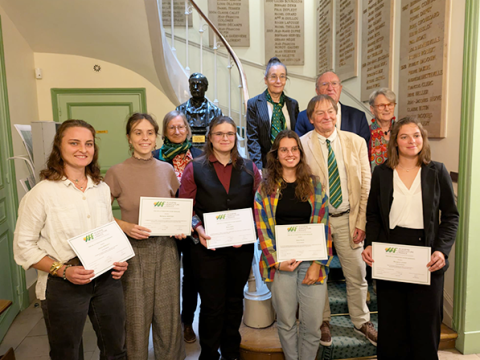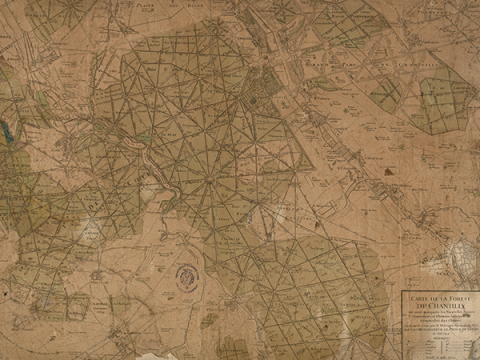
Marie Neri, winner of the Xavier Bernard Prize for her memoir
September 25 2025A student at AgroParisTech on the Nancy campus and a graduate since March 2025, Marie Neri stands out for her unique background combining natural sciences and a passion for history. After hesitating between studying classical literature and biology, she finally chose the BCPST preparatory classes, which led her to AgroParisTech, where she specialized in forest ecosystems. Her final memoir has just been awarded the prestigious Xavier Bernard Foundation and French Academy of Agriculture prize for final memoirs, a recognition that crowns her innovative work at the crossroads of ecology and history.
Can you briefly describe the topic of your final memoir and what motivated you to choose this subject?
My final-year project falls within the field of historical ecology, a fascinating discipline that involves going back in time to understand how current ecosystems have been shaped by past human activities. Specifically, I used 18th-century archival documents to reconstruct the management practices and condition of the Chantilly forest during the era of the Princes of Condé. The goal was to compare this historical reconstruction with current data collected on the same forest to better understand its history and evolution, both in terms of the appearance of its stands and its biodiversity. What motivated me to choose this topic was the approach, which perfectly combines my two passions: ecology and history. I have always had a keen interest in past civilizations, whether through my reading of mythology or my practice of medieval fencing, and this curiosity now has a concrete scientific outlet: I find it absolutely fascinating that ecosystems that we now describe as “natural” still bear the traces of our passage, the mark of past human use, for so long.
How did you conduct your research? Did you work in partnership with professionals in the field, laboratories, or other institutions?

I was lucky enough to get this internship with Jean-Luc Dupouey, who works as a researcher at the joint research unit (UMR) Silva. He was the one who introduced me to historical ecology during my second year, and it was a revelation! So I was welcomed at the INRAE center in Champenoux, where I was able to benefit from his experience and valuable advice in structuring my research, as well as that of Laurent Saint-André from the BEF research unit, who knew the Chantilly area inside out. But the highlight of this experience was the extraordinary opportunity I had to spend four weeks in the reading room of the Condé Museum archives. Just imagine: I was immersed in documents dating back more than two centuries, deciphering the handwriting of the time, studying and photographing these testimonies of the past! I had rich exchanges with the museum’s archivists, who shared their expertise to help me contextualize my discoveries. It was a simply magical experience, more like historical detective work than a traditional internship!
How did your training at AgroParisTech prepare you to lead this research project?
The training program at the Nancy campus, where I spent my second and third years of school, first gave me the solid scientific foundation I needed to fully understand the ecological and forestry issues I studied. All of the courses were essential for interpreting historical data from an ecologist’s perspective. But I would say that it was above all the fact that I was constantly exposed to diverse and original projects during my training that gave me the adaptability I needed to tackle an unusual subject! At AgroParisTech, we are constantly pushed out of our comfort zone: complex case studies, multidisciplinary approaches, collaborative projects… This habit of innovation and versatility is really what allowed me to juggle between analyzing 18th-century archives and processing contemporary ecological data. It was the ideal preparation for interdisciplinarity!
What does this recognition by the French Academy of Agriculture mean to you? Did you ever imagine that your work would be honored with such a prestigious award?
Not really. Historical ecology remains a fairly niche discipline, at the crossroads of several scientific fields. When I learned that my memoir had been selected as one of the winners of the Xavier Bernard Prize, I was certainly honored by the recognition of my work, but above all I was touched to see that such a subject had caught the jury’s attention. This distinction goes beyond simple personal recognition: it highlights the importance of this interdisciplinary approach in a context where understanding the evolution of ecosystems is becoming crucial in the face of current environmental challenges. Writing this thesis and presenting it to the Academy is a wonderful opportunity to share topics that I am passionate about. To feel that this interest is shared by such a prestigious jury is a wonderful feeling that encourages me to continue along this still relatively unexplored path.
What perspectives does this work open up for the rest of your professional career? How do you plan to further develop or apply the results of your research?
This work literally opened the doors to historical ecology for me, a field I had dreamed of specializing in ever since discovering the discipline in my sophomore year! Thanks to this practical and recognized experience, I was able to successfully apply for the thesis topic I am currently working on, still in this field that fascinates me, but this time going even further back in time as I am working on the Gallo-Roman period! You see, now I can really “count flowers while sending emails to fellow archaeologists,” the perfect balance for someone like me! As for Chantilly, I really hope to have the opportunity to work on the subject again, either alongside my thesis work or after I finish it, particularly to explore the fascinating issue of forest decline over the centuries. These archives still hold so many secrets… there’s enough there for a second thesis! History definitely continues to feed ecology.

